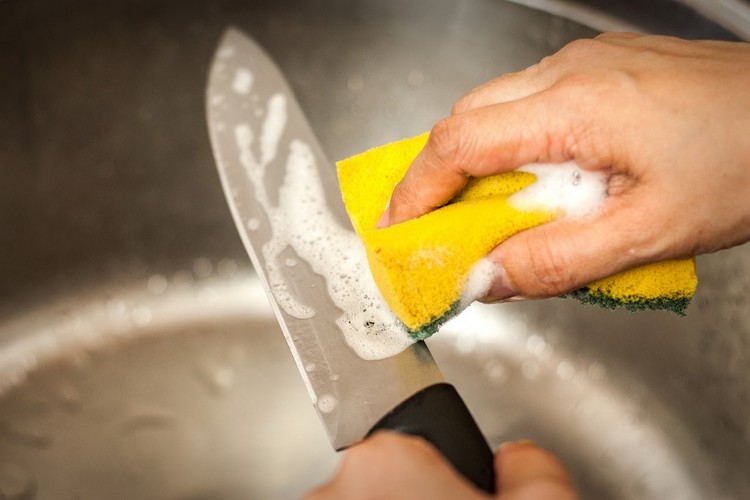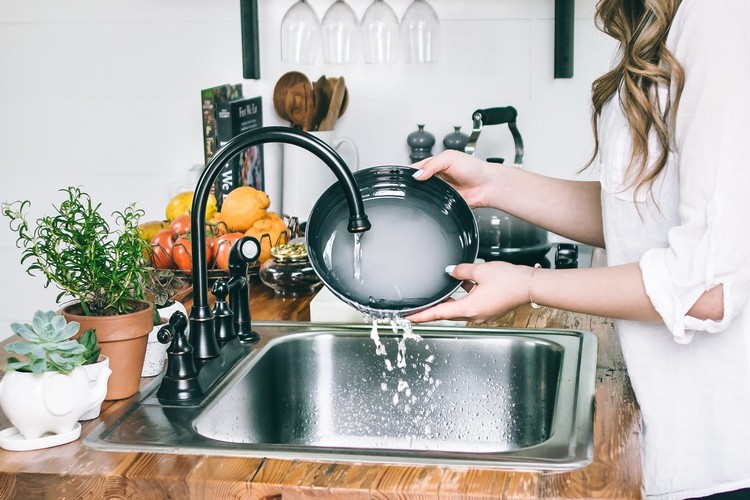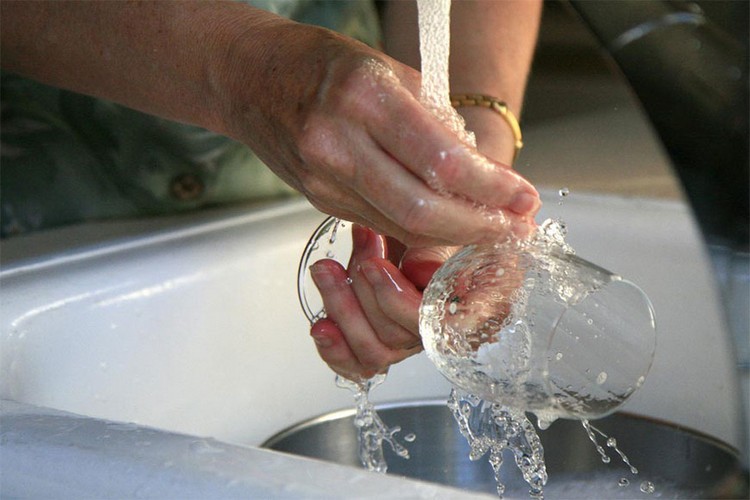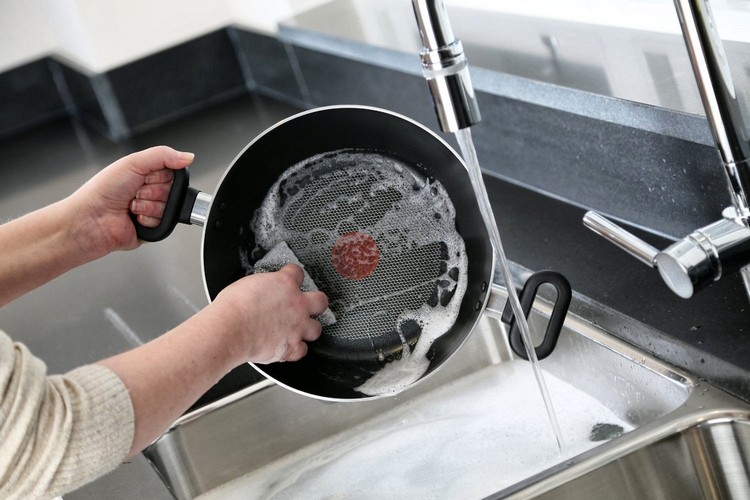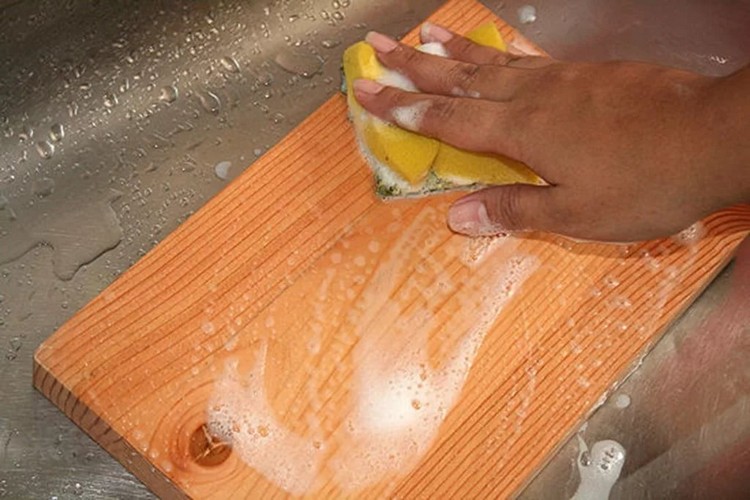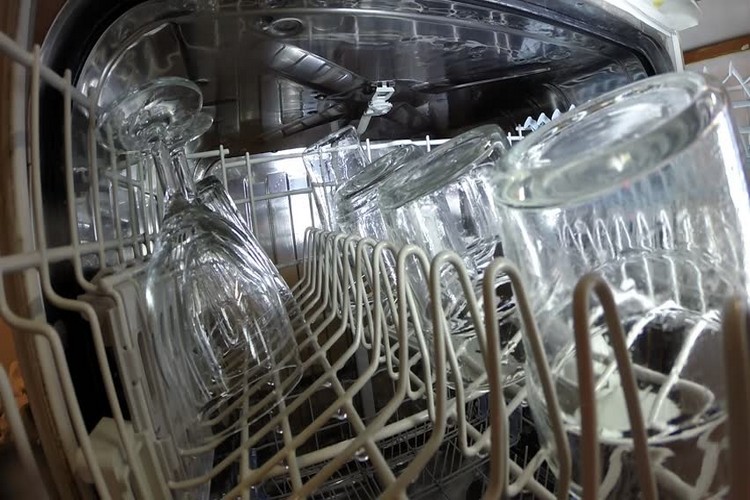An overview of what you shouldn't put in the dishwasher - a list of inappropriate dishes
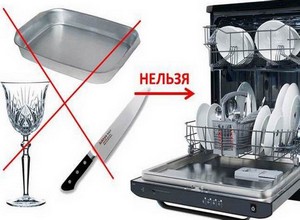 The dishwasher has become a wonderful helper for housewives.
The dishwasher has become a wonderful helper for housewives.
It saves time and effort on cleaning after meals. But not all kitchen utensils are machine washable.
Articles made of tempered glass, heat-resistant plastic, porcelain and ceramic items without a pattern, enamelware - all this and more can be loaded into the dishwasher.
The identification mark will be the symbol on the dishes, which depicts the plates in the dishwasher container.
This icon may vary from manufacturer to manufacturer, but the essence is the same.
And here are what dishes should not be washed in the machine, let's analyze in this article.
Content
Knives and tools
Under the influence of high temperatures and aggressive detergents, the metal of which knife blades are made is subject to corrosion.
Despite the fact that the manufacturer often calls the steel of which knife blades are made stainless (stainless steel), in some cases rust does appear.
In addition, the knife's resistance to rust is also determined by the coating of the blade. Under the action of a strong pressure of heated water, the substance, designed to protect the blade, over time is erased from the surface, exposing the vulnerable metal. The edge of the knife becomes blunt, and it becomes necessary to sharpen the knife.
In addition, the handle of the knife can also be exposed to hot water and detergent. This is how wooden handles deteriorate after only a few wash cycles.
Do not immerse in the dishwasher kitchen grates, scissors, knives from meat grinders, food processors and blenders. The items on this list are bound to become dull during washing.
Metal dishes
Plates, mugs, pots and other dishes made of metal require washing at low temperatures and with gentle detergents.
Washing them in the dishwasher can not only spoil the integrity and appearance of the product, but also lead to the ingestion of harmful chemical elements.
Aluminum cookware
Aluminum is a very active metal that easily reacts chemically with other substances, including water.
Aluminum has a film of oxide on its surface that readily dissolves in an alkaline environment. The alkalis in dishwasher detergents dissolve and wash this film from aluminum flatware. A dark, indelible film will form on their surface, ruining the appearance of the dishes.
At the same time, harmful chemical compounds can get into the food, because the protective layer on the dishes is no longer present.
Cast iron cookware
Frying pans and sauté pans, cauldrons and casseroles, cast iron trays are considered durable and long-lasting cookware that can withstand high temperatures during cooking on the stove, in the oven, and on the grill.
But in the dishwasher under the influence of fluctuations in water temperature, chemical detergents, cast iron can crack and corrode. The dishes will lose not only their appearance, but also their functionality.
Therefore, it is better to wash cast-iron items by hand, using nonaggressive means.
Silver crockery
Silver forks and spoons, sets and trays have always been considered a sign of wealth and good taste. To this day, good housewives still have silverware in their kitchens. But you should never mix silverware with a dishwasher.
The chemicals in dishwasher detergents will have a negative effect on the shine of silverware. Silver becomes cloudy and grayish and resembles aluminum.
Copper tableware
When detergents contained in dishwasher tablets interact with copper items, the latter lose their attractive appearance - they darken and become cloudy.
It is not possible to return the dishes to their original condition, so it is better to prevent spoilage.
Melchiorovaya crockery
Beautiful and elegant dishes made of copper-nickel alloy (melchior) will be seriously damaged after washing in a dishwasher: they will become dark, cloudy and the pattern will fade.
Plastic dishes
Before you open the machine and load plastic dishes into it, you should study the symbols on the back.
Only heat-resistant food-grade plastic with a special symbol on it can be washed in the washer-dryer. The crossed out symbol expressly forbids washing in the dishwasher, as well as the "PS" (polystyrene) or "PVC" (PVC) symbols. When heated, these substances turn into harmful compounds and are poisonous to humans.
Disposable plastic cups, cutlery and food containers should never be washed in the dishwasher. Such dishes should be discarded after a single use.
Very delicate items
Delicate and delicate crockery made of crystal and porcelain, ceramics and glassware can crack or shatter under the pressure of water while in the machine.
Some washing machines have a delicate mode specifically designed for such items.
Let's see how not to spoil expensive tableware below.
Crystalware
It is desirable to wash crystal in the dishwasher separately from the other dishes, using a special mode for washing crystal, with gentle detergents and rinse aid for shine.
Nevertheless, this does not guarantee that the crystal glasses or vases will remain intact and will not lose their original appearance. Therefore, it is better to wash them by hand.
Porcelain
If there is no special image on the porcelain dishes, which allows washing in the machine, it is better to abandon this idea.
Not only can the delicate porcelain be cracked by the high temperatures of water and steam, but the patterns and decorative elements that adorn porcelain items can be irretrievably washed away.
Patterns and gilding on the rim of cups and saucers are not resistant to detergents (such as "Fae"), so dishes will lose their decent appearance after the first cycle in the washer.
Ceramic dishes
In most cases, the manufacturer allows cleaning ceramic dishes in the dishwasher, but do not forget about the applied images. If the dishes are decorated, they are automatically considered suitable for washing only by hand.
Clay dishes
Pots and molds made of clay but covered with glaze must not be put in the dishwasher.
The porous structure of the material will lose its strength during prolonged exposure to hot water, steam and chemicals and will soon crack.
Nonstick coated cookware
Non-stick coating is very easy to use: food does not burn, which facilitates both cooking and cleaning.
But such a coating is not always strong and durable and requires special care.
Teflon-coated frying pan
Teflon coating is unstable and very sensitive to chemical compounds of detergents. It deteriorates and cracks after only two or three washes in the washing machine. Teflon falls off and begins to peel, and when cooking, it can spoil the dish.
Cookware with granite and marble chips
These pans, cauldrons and sauté pans are very durable, little susceptible to mechanical damage and retain heat well.
But this material is afraid of aggressive detergents, so not every dish with a granite composition can be washed in the dishwasher. Make sure of this possibility, you can carefully study the label from the dishes.
Ceramic coating
Just like all-ceramic cookware, a ceramic-coated nonstick pan is very good for cooking on any cooktop. But it can be spoiled when washing in a washing machine, so such products are better to save and wash by hand.
Wooden crockery and cutting boards
Wooden plates, spoons, cutting boards, as well as any dishes with wooden handles are absolutely not suitable for the dishwasher.
During the operation of the washer, the wood swells under the influence of hot water and hot steam, and after drying loses its shape and cracks. Wooden products deteriorate after only a few washes.
Kitchen utensils
In the kitchen there is always a huge number of different items, with the help of which cooking becomes fast and intricate.
But not all items of kitchen utensils can be washed in the washing machine.
The grater .
As described above, the blades on a grater can get dull when washed in the dishwasher. But don't forget that the food debris that clogs the holes in the grater is washed out during the wash cycle and clogs the machine's drain filters.
It is much easier to fill the grater with detergent and wash it by hand immediately after use, without causing yourself unnecessary problems.
Strainer and colander
A strainer in the dishwasher can become deformed, and bits of food or tea leaves can clog the filters.
A colander made of plastic can only be washed in the dishwasher if the manufacturer allows it. Aluminum colanders can only be washed by hand.
The same applies to the garlic press. The washing machine will not wash out the garlic residue in the small holes. And while the hostess will clean the garlic press, the latter will wash well under running water at the same time.
Glass jars
From year to year, preparations can be sterilized and closed in the same jars, but it is advisable to change the lids.
Glass jars can be washed in the dishwasher if they have no labels and there is no food left in them.
But lids should not be loaded into the washing machine, as the silicone layers on the inner surface of tin lids will be destroyed during washing.
Thermoses, Lunch Boxes and Thermocaps
The design and outer material may be quite washable in a washing machine. The inner construction, which retains heat, will deform under the dividing influence of high temperatures and will no longer perform its function.
It is better not to wash such dishes in the dishwasher, so that they retain the heat of cooked food as long as possible.
Silicone molds
Silicone mats and molds can be washed in the dishwasher, but do not forget that they can absorb aggressive chemicals, so if they are slightly dirty, they can be quickly washed under the tap.
Thus, the dishwasher is an indispensable helper in the kitchen, but it should be used wisely so as not to spoil not only the dishes, but also the dishwasher itself.
Useful Video
This video will tell you what types of dishes you can't put in the dishwasher:



